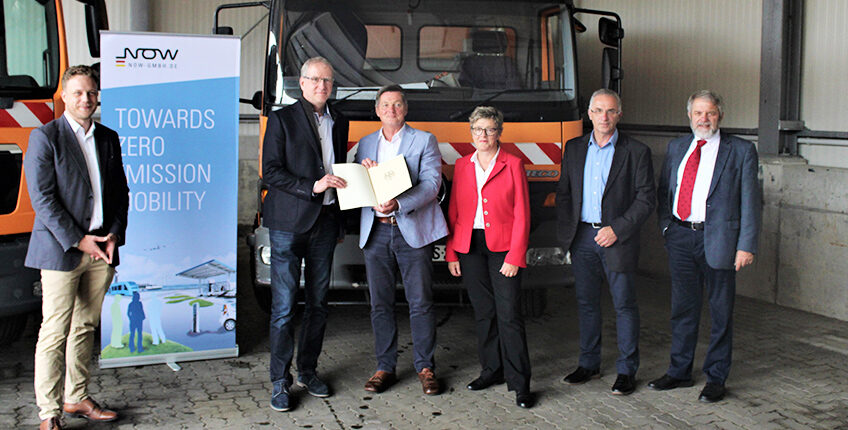The Federal Ministry of Transport and Digital Infrastructure (BMVI) has approved funding of up to around €1.2 million for the purchase of 2 large road sweepers with emission-free fuel cell technology. The purchase is funded under the National Innovation Programme for Hydrogen and Fuel Cell Technology (NIP 2), which is coordinated by NOW GmbH and implemented by Project Management Jülich (PtJ).
Enak Ferlemann, Parliamentary State Secretary at the Federal Ministry of Transport and Digital Infrastructure: “Less greenhouse, pollutant and noise emissions in the urban area – the deployment of two new climate-friendly large road sweepers in Lüneburg is a real investment in the future. The BMVI is fully supporting this project with over 1 million euros, because we are working on making our country climate-neutral by 2045. For this we need engaged players on the ground. Lüneburg is setting the example here.”
Among other services, Abwasser, Grün & Lüneburger Service GmbH (AGL) also provides the municipal service of city cleaning for the Hanseatic city of Lüneburg. Street cleaning is a part of this service. Around 344 km of streets, including squares, footpaths and cycle lanes need to be cleaned regularly. In the process, around 1,700 t of sweepings accumulate annually in the urban area of Lüneburg, most of which is picked up by sweepers of varying sizes, depending where they are deployed. The AGL already has its first smaller emission-free e-sweeper in operation.
The funding enables AGL to invest in the purchase of vehicles and now already in the vehicle segment for heavy-duty specialized vehicles with emission-free hydrogen drives.
As soon as 2008, AGL began to use prototype-like e-vehicles long before the discussion about alternative drives in the municipal context. In the meantime, with its high share of e-vehicles and the associated savings in emissions of CO2 and nitrogen oxides, AGL is setting the bar nationally when compared to towns of a similar size. Furthermore, AGL is one among few municipal companies to produce its own electricity. All AGL electric vehicles are operated with 100 per cent ecologically-generated electricity, without having to consume fossil fuels or produce biomass for electricity generation, or consuming other national resources. This is because the sewage gas produced at the company’s own sewage treatment plant is used to produce electricity. AGL’s facilities on Bockelmannstrasse are self-sufficient in energy. 21 e-vehicles will begin operation in 2022 at the latest. That represents 20% of the entire fleet. Compared to 2016, this will save around 13% of the annual CO2 emissions caused by mobility, or 51 t per annum. The vehicles also include special vehicles such as a compactor vehicle, a lifting platform and inspection vehicles for sewage canal inspections and a service vehicle for playground inspection. The first e-truck with a loading platform is also in production.
By 2029 at the latest, AGL plans for its operations to be as climate-neutral as possible, including the use of vehicles and equipment. According to current estimates, not all vehicles and equipment will be converted to alternative drives by then. AGL keeps for example, mobile diesel-operated emergency pumps, and needs outboard engines for boats that deploy in emergency and catastrophe situations.
AGL is a member of the Wasserstoffnetzwerk Nordostniedersachsen ( H2.N.O.N) (North-East Lower Saxony hydrogen network) and involved in the development of a hydrogen network – www.h2non.de.
AGL is in advanced, concrete talks with companies wishing to establish hydrogen production and a filling station in the ‘Harbour’ industrial area. AGL can in this way, contribute to market activation in the hydrogen economy.


